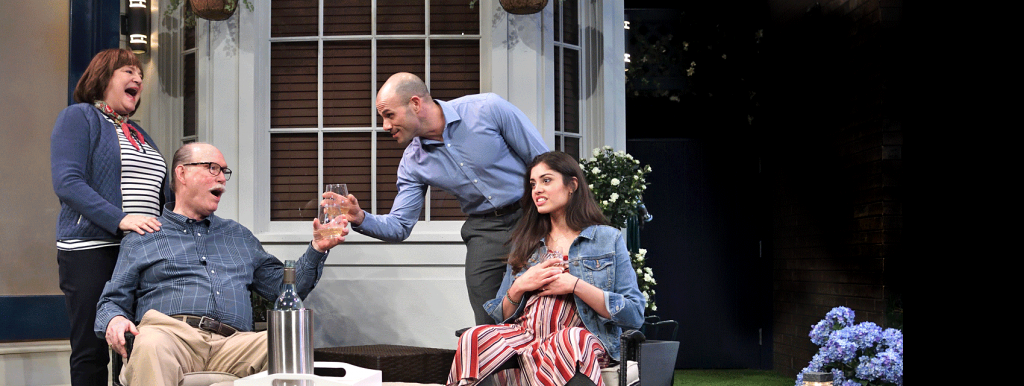Get Trinity Rep’s production history list.
Trinity Rep stands on what was once the lands of the Masswascut — The Land between the two rivers, and the territory of Meshanticut, which are the ancestral homelands of the Narragansett, Pokanoket, and Nipmuc people.
Beginning with colonization, and continuing for centuries, these communities have been dispossessed of most of their ancestral lands in Rhode Island by the actions of individuals and institutions.
Additionally, as contemporary Rhode Islanders, we hold the legacy of this state’s economic foundation through its participation in the triangle slave trade. It is our responsibility to understand these actions, commit to honor the past, and build our future with truth.
Trinity Rep was founded in 1963 when a small group of Rhode Island citizens sought to create a professional resident theater company in Providence. They hired Adrian Hall, a New York-based director originally from Texas to be the Artistic Director. By the next year, the theater began performing at Trinity Union Methodist Church, located on Broad St. in Providence – the first production, The Hostage by Brendan Behan, opened on March 14, 1964 to rave reviews.
In 1966, Trinity received substantial funds from the newly founded National Endowment for the Arts to fund the landmark Project Discovery program, which allowed high school students from all over the state to attend professional live theater for free. This brought a fair amount of attention to the theater, both in the state as well as nationally, and the funding from the NEA also helped to stabilize the theater’s financial health. In 1968, Trinity Rep became the first American theater company to perform at the Edinburgh International Festival in Scotland.
By 1973, Trinity Rep moved to its present home, the Lederer Theater Center at 201 Washington Street in downtown Providence. Formerly a historical vaudeville performance house known as the Emery Majestic Theater, the historic building was refashioned to house two performance spaces: the 500+ seat Elizabeth and Malcolm Chace Theater and the 250+ seat Sarah and Joseph Dowling, Jr. Theater, as well as offices, production shops, and rehearsal halls. In 1977, the Trinity Rep Conservatory, a graduate studies program in acting and directing, first opened.
Trinity’s reputation continued to grow, culminating in the company receiving the Tony Award for Outstanding Regional Theater Company in 1981. During the next decade, the theater produced four television productions for PBS, toured India and Syria, and continued to show a strong commitment to the development of new works. In 1989, Adrian Hall passed the torch to Anne Bogart, who spent a year as artistic director before resident acting company member and associate director Richard Jenkins assumed the job for the next four years.
In 1994, Oskar Eustis became Trinity Rep’s fourth artistic director, and oversaw a period of substantial artistic and financial growth. In 2001, a partnership between Trinity Rep and Brown University created the Brown/Trinity Rep MFA program for actors and directors. In 2005, thanks to the support of Citizens Bank, Trinity Rep opened the Pell Chafee Performance Center on Empire Street, just a block from the Lederer Theater Center, which featured a theater space with flexible seating for up to 250 as well as a number of classrooms and rehearsal spaces to house the MFA program as well as Trinity Rep’s educational classes for children and adults.
In 2006, Curt Columbus, an accomplished playwright and translator, as well as a director, took over for acting artistic director Amanda Dehnert to helm Trinity Rep forward into the 21st century. In 2014, in celebration of Trinity Rep’s fiftieth anniversary, Trinity Rep was named the State Theater of Rhode Island. In 2019 and 2020, Trinity Rep earned the highest-possible Charity Navigator 4-star rating, an indication of financial accountability, transparency, and health.
Today, as Rhode Island’s largest arts organization, Trinity Rep has a significant impact on the community, and is a linchpin of Providence’s arts and entertainment district. With an annual budget of $10 million, the theater employs over 100 artistic and administrative staff, and generates more than $13 million in economic activity each year. Trinity Rep’s educational initiatives continue to provide instruction and enrichment to people of all ages and abilities, and our Project Discovery program introduces over 16,000 children each year to live theater. The tuition-free Brown/Trinity Rep MFA program has become a leader in graduate training for actors and directors by offering in-depth training in conjunction with a professional theater, and is widely regarded as one of the best in the country.

